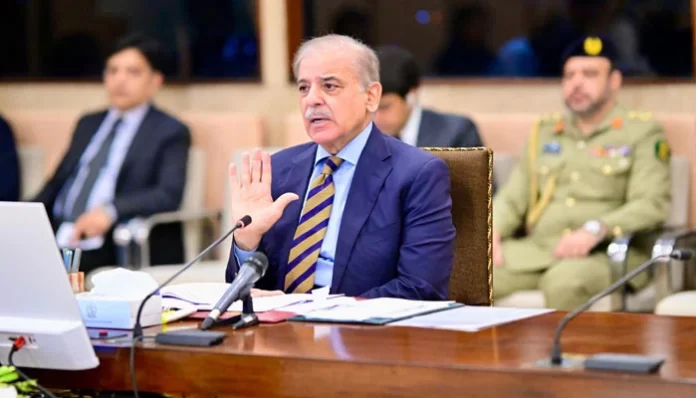ISLAMABAD: Prime Minister Muhammad Shehbaz Sharif on Thursday reiterating the government resolve to transform Pakistan’s economic landscape, said that the national security of the country had direct linkages with the economic security.
“If we are economically strong, our exports are growing fast, industrial sector is
expanding…….then our economic security will automatically strengthen our critical
security”, the prime minister said while addressing the 26th National Security
Workshop of Defence University.
Emphasizing the government’s commitment to execute a comprehensive ‘Charter
of Economy’, the prime minister said that in 2018, he as an opposition leader, also
suggested the idea of charter of economy and now ‘We are fully prepared to
execute this idea’.
The prime minister, stressing the need to privatize all the State Own Entities
(SOEs), said, ‘The government's mandate is only to facilitate the private
businesses. We should completely do away with the businesses to save trillions of rupees’ he said adding that all institutions were on same page and he and the Army chief were
also fully aligned on this issue.
Facilitating the audience over strong performance of Pakistan Stock Exchange that
crossed 100,000 points on Thursday, the prime minister said this was the result of
team effort and close coordination among the federal government and various
stakeholders. “This is also about business sentiments and we believe that Pakistan
is slowly and steadily moving towards right direction”.
He said the day before yesterday the stock market witnessed a steep fall of around
4000 points due to what happened in Islamabad, however he said as the situation
became normal, the market rebounded in next couple of days and crossed the
100,000 points which never happened in history of Pakistan.
The prime minister said this was the fact that over a period of time spanning over a
decade, the economic progress slowed down rather deteriorated due to various
factors.
He said the country was still facing many challenges. “We all know that in June
2023 it was touch and go as Pakistan was at the verge of default due to various of
reasons that we all know.”
The prime minister highlighted that the government managed to bring the economy
out of crisis due to a successful standby agreement with the International Monetary
Fund (IMF).
However, he said that the programme would bring more hardship to the people but
the government had no choice.
He also hoped and prayed to the Almighty that this would be the last programme
with the IMF.
Prime Minister Shehbaz Sharif stated that over the past 76 years, Pakistan has seen
numerous brilliant economic plans, but they have failed due to a lack of will to
implement them.
He said that the government was preparing a homegrown plan that would be
implemented in letter and spirit. “I will do my best along with my colleagues to
implement this plan in letter and spirit and transform Pakistan’s economic
landscape.”
Other than the economic challenges, the prime minister said the country was also
facing the security challenge. He said around 80,000 people had sacrificed their
lives in war against terrorism and the economic losses touched US$130 billion.
During the Nawaz Sharif government, the terrorism was completely defeated,
however this monster had surfaced again and was showing its ugly face as the sad
incidents were happening on daily basis.
“What happened in Parachinar just a few days ago, innocent people lost their lives
from both sides”, he expressed the grief.
The prime minister stated that there was an attack on Islamabad, in which
thousands of people marched with guns, aiming to create uncertainty and chaos.
Their ultimate goal was to destroy the government’s untiring efforts in stabilizing
the country’s economy.
During question answer session, the prime minister said until we do not bring
quantum jump in economic growth, the external debt gap could not be filled. In order to get rid of the external debt, we will have to generate our own resources, he
added.
As regards the internal debts challenge, the prime minister said the biggest problem
was in the power sector, as the power circular debt had touched two and half
trillion rupees and the gas circular debt was also growing due to leakages, gaps in
management and system, and theft.
With respect to the issue of tax evasion, the prime minister lamented that tax
evasions worth trillions of rupees was being reported that had to be stopped.
Deputy Prime Minister and Foreign Minister Ishaq Dar, Finance Minister
Muhammad Aurangzeb, Planning Minister Ahsan Iqbal, Commerce Minister Jam
Kamal Khan, Minister for Economic Affairs Ahad Khan Cheema, Privatization
Minister Aleem Khan, and Information Minister Ataullah Tarar were also present
on the occasion.




